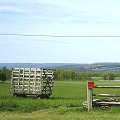- By -Staff
- Around Town
 Print
Print  New York State Agriculture Commissioner Patrick Hooker today announced the availability of nearly $845,000 to encourage organic production in New York State. The funding is provided by the USDA Natural Resources Conservation Services (NRCS) as part of its Environmental Quality Incentives Program (EQIP).
New York State Agriculture Commissioner Patrick Hooker today announced the availability of nearly $845,000 to encourage organic production in New York State. The funding is provided by the USDA Natural Resources Conservation Services (NRCS) as part of its Environmental Quality Incentives Program (EQIP).“With the growing trend of organic agriculture here in New York, we are particularly pleased that the new Farm Bill is helping farmers fund conservation practices that will in turn aid in their transition to organic production,” the Commissioner said. “Farmers who are currently in the transition process, as well as those who are certified organic, are eligible to take advantage of USDA’s EQIP Organic Initiative funding and encouraged to do so.”
The 2009 EQIP Organic Initiative was included in the 2008 Farm Bill to provide financial assistance to certified organic producers as well as producers in the process of transitioning to organic production. The program has $845,562 designated for New York producers, and will provide payments and technical assistance to transitioning and existing organic farmers who adopt NRCS conservation practices.
Eligible producers include those in the three-year process of transitioning to organic production; existing certified organic farmers who want to transition additional acres or animals; and existing certified organic farmers who need to adopt additional conservation measures. Producers who sell less than $5,000 in agricultural products and are thus exempt from formal organic certification are also eligible for Organic Initiative payments.
Sign-up for the program begins May 11 and continues through May 29, 2009 at county NRCS offices. Individual applicants can receive a maximum of $80,000 over the next six years, and no more than $20,000 in any one year. Farmers who have already applied for EQIP funding may choose to move their application into the separate pool of funding for the Organic Initiative, which will have higher payment rates for some practices than the regular EQIP program.
The conservation farm practices eligible for payment under this program include, but are not limited to: conservation crop rotation, cover crop, nutrient management, pest management, prescribed grazing and forage harvest management. Other practices designated for reimbursement in New York State include: strip-cropping, riparian forest buffers, grassed waterways, micro-irrigation, fence and watering facilities.
Farmers transitioning to organic production can also develop an “organic conservation activity plan” as part of their EQIP Organic Initiative contract. An organic conservation activity plan must be consistent with National Organic Program certification requirements.
Farmers who are awarded an EQIP Organic Initiative contract are also eligible for technical assistance to assist with implementation of practices. NRCS has set aside an additional $5 million nationally for technical assistance for this initiative, which will not count against the payment limitation of the program.
New York State ranks among the top ten states in the country for the number of organic farms. In 2007, the U.S. Census identified 1,027 organic farms in New York State with nearly 121,000 acres in production, although only 736 farms are known to be certified organic. Organic dairy farms are the largest segment of the organic farm community in New York State with nearly 400 farms. The Census also found that 562 farms were transitioning another 30,687 acres to organic production.
----
v5i20



